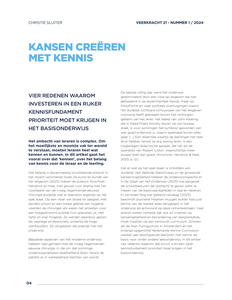Recently, the Dutch government raised the retirement age of workers in the Netherlands. In this study we focused on the work values of low-skilled older workers, the extent to which their jobs fulfill these values, and the effect of work values on the willingness of these workers to extend their working life. This study is based on a literature review and a secondary analysis on a large database of persons aged 45 and older (STREAM). The study shows that extrinsic work values are more important for low-skilled older workers, and intrinsic work values more relevant for high-skilled older workers. The most important work values for low-skilled older workers are fulfilled slightly more often than those of high-skilled older workers. The extent to which important work values are fulfilled in the jobs of low-skilled older workers is positively correlated with job satisfaction and with their own assessment of whether or not to continue working for another 12 months. Based on this research, we formulated recommendations for HR practices on the employability of low-skilled older workers
DOCUMENT

De discussie rondom de waarde van werk wordt vaak gevoerd op basis van objectieve maatstaven van banen: verdiensten, aantal uren of baan zekerheid. Subjectieve kenmerken, zoals autonomie of baantevredenheid, zijn echter minstens zo belangrijk voor de innerlijke beleving van nuttig en betekenisvol werk. In dit artikel laten we twee dingen zien: 1) er zijn significante verschillen in de nutservaringen tussen werknemers, die niet verklaard worden door zelfselectie in beroepen en sectoren; en 2) deze verschillen zijn bepaald. In de regio Utrecht ervaren werknemers relatief veel autonomie, in Twente ervaart men relatief veel verbondenheid met de werkomgeving, en nergens zijn mensen zo tevreden met hun baan als in Delft en het Westland. We pleiten voor een regionale aanpak in het streven naar waardevol werk.
DOCUMENT
OBJECTIVES: This study compares the scope of practice of Dutch dental hygienists (DHs) educated through a 2- or 3-year curriculum ('old-style DHs') with that of hygienists educated through a new extended 4-year curriculum leading to a bachelor's degree ('new-style DHs'), with the aim to investigate whether an extended scope of practice positively affects perceived skill variety, autonomy and job satisfaction.METHODS: The questionnaires were obtained from old- and new-style DHs (n = 413, response 38%; n = 219, response 59%, respectively), in which respondents had recorded their dental tasks, perceived skill variety, autonomy and job satisfaction. T -tests were used to analyse differences between old- and new-style DHs, and regression analyses were performed to assess the relation between scope of practice and skill variety, autonomy and job satisfaction.RESULTS: New-style DHs have a more extended scope of practice compared with old-style DHs. Despite their more complex jobs, which are theoretically related to higher job satisfaction, new-style DHs perceive lower autonomy and job satisfaction (P < 0.05). Skill variety is the strongest predictor for DHs' job satisfaction (β = 0.462), followed by autonomy (β = 0.202) and caries decisive tasks, the last affecting job satisfaction negatively (β = -0.149). Self-employment is the strongest significant predictor for autonomy (β = 0.272).CONCLUSIONS: The core business of DHs remains the prevention and periodontology services. New-style DHs combine these tasks with extended tasks in the caries field, which can lead to comparatively less job satisfaction, because of a lower experienced autonomy in performing these extended tasks.
DOCUMENT
Vier redenen waarom investeren in een rijker kennisfundament prioriteit moet krijgen in het basisonderwijs. De vier redenen zijn: 1. De aanwezigheid van kennis is een voorwaarde voor het leren van nieuwe kennis. 2. Gedeelde kennis maakt samenwerken mogelijk. 3. Meer kennis, meer kansengelijkheid. 4. Alleen een leraar met kennis kan lesgeven. Het gaat vooral over het belang van kennis voor de leraar en de leerling.
DOCUMENT

Het succes van een merk wordt steeds meer afhankelijk van de manier waarop sociale media worden ingezet. Organisaties proberen met behulp van sociale media brand communities te ontwikkelen om informatie te delen, merkwaarden te communiceren en klantrelaties te onderhouden
DOCUMENT

Deze focusgroep studie geeft inzicht in de redenen en motieven van vrouwen om vroegtijdig te stoppen met het geven van borstvoeding of om vroegtijdig kunstvoeding te gaan geven. De resultaten van dit onderzoek zijn gebaseerd op een kwalitatief onderzoek met 10 focusgroepen met in totaal 69 vrouwen die op het moment van het onderzoek borstvoeding gaven aan hun kind maar die vroegtijdig kunstvoeding gingen geven naast de borstvoeding (voordat de baby 6 maanden oud was), en vrouwen die borstvoeding hebben gegeven maar die op het moment van het onderzoek, voordat de baby 6 maanden oud was,daarmee waren gestopt. Het doel van het onderzoek is niet geweest om kwantitatieve gegevens op te leveren; daartoe is kwantitatief vervolgonderzoek nodig.
MULTIFILE

Impact maken vinden PD-kandidaten Armand Odekerken, Jasmijn Ruijgrok en Jenny Zwijnenburg een van de belangrijkste redenen om aan het PD-traject mee te doen. Dat vertelden ze in een sessie tijdens de conferentie Onderzoek & Impact die Regieorgaan SIA en de Vereniging Hogescholen organiseerden op 3 juni 2024.
LINK
De daadwerkelijke trainingsbelasting van een sporter komt vaak niet overeen met de door de coach beoogde trainingsbelasting. Bekende oorzaken zijn een verkeerde inschatting van de belastbaarheid van de sporter en moeite met het gebruik van de RPE schaal. Op basis van recent onderzoek wordt het belang van een goede instructie bij het gebruik van de RPE schaal benadrukt.
LINK
Beargumentering van het unieke karakter van de begraafplaats 'Nabij Kapel in 't Zand' te Roermond.
DOCUMENT
1e alinea column: Een van de simpele redenen dat we zoveel meningen, inzichten en dus vaak verwarring rond de impact van internet voorbij zien komen, is heel simpel dat we, in ieder geval in Nederland, zo veel verschillende begrippen gebruiken voor het zelfde. Dat is heel begrijpelijk maar tegelijkertijd jammer, omdat volgens mij vaak om die reden samenwerkingen niet tot stand komen en verbanden niet zichtbaar worden.
LINK